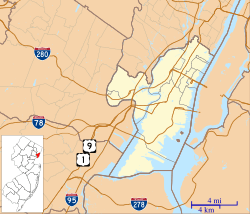The Beacon (Jersey City) facts for kids
|
Jersey City Medical Center
|
|
The Beacon in 2020
|
|
| Location | Roughly bounded by Montgomery Street, Cornelison Avenue, Dupont Street and Clifton Place, and Baldwin Avenue, Jersey City, New Jersey |
|---|---|
| NRHP reference No. | 85003057 |
Quick facts for kids Significant dates |
|
| Added to NRHP | November 27, 1985 |
The Beacon is a mixed-use development located on a 14-acre (57,000 m2) site on Bergen Hill, a crest of the Hudson Palisades and one of the highest geographical points in Jersey City, Hudson County, in the U.S. state of New Jersey. The Beacon, which occupies the Jersey City Medical Center's rehabilitated original complex, creates the northeastern corner of the Bergen-Lafayette section and is just east of McGinley Square. The Beacon includes 2,000,000 square feet (190,000 m2) of residential and retail space, approximately 1,200 luxury residences and 80,000 square feet (7,400 m2) of retail space.
Jersey City Medical Center moved to the site in 1882, and the complex was expanded in stages through the mid-20th century. Metrovest Equities was designated the redeveloper of the property in the first decade of the 21st century. The redevelopment stalled after a down-turn in the market, but was completed by April 2016.
The complex is listed on the national and New Jersey registers of historic places.
History
During the Great Depression, new buildings were added as a Works Progress Administration project secured by Mayor Frank Hague, The Jersey City Medical Center included such architectural and designer trappings as marble walls, terrazzo floors, etched glass, decorative moldings and glittering chandeliers, and had one of the most famous maternity wards in the country – the Margaret Hague Maternity Hospital.
During the 1950s, JCMC was the home of the medical school of Seton Hall University, which later became the New Jersey Medical School, now located in Newark. Oversized and understaffed, in 1988 the hospital became a private, non-profit organization. In 1994, the State of New Jersey designated it as a regional trauma center, and in the late 1990s it was approved as a core teaching affiliate of Mount Sinai School of Medicine.
Metrovest Equities was designated the redeveloper of the property in 2003 and officially closed on it in 2005. The developer converted the ten federally landmarked, Art Deco buildings in the largest residential restoration project in the country and the largest in the history of New Jersey, with an expected cost estimated at $350 million.
Use of existing infrastructure and restoration
The existing buildings are listed on the New Jersey Register of Historic Places and National Register of Historic Places.
The first buildings to be renovated were the Rialto and Capitol buildings, which now serve as residential condominiums and entertainment spaces. The restoration of these two buildings alone was estimated over $133 million and it took over four years to complete. In 2009, the New Jersey Department of Environmental Protection Historic Preservation Office awarded an Outstanding Contribution of Excellence Award to the contractors and architects and others who participated in the restoration of the Rialto and Capitol buildings.
See also
- List of neighborhoods in Jersey City, New Jersey
- List of Registered Historic Places in Hudson County, New Jersey
- Historic districts in Hudson County, New Jersey
- Whitlock Cordage
- Hudson and Manhattan Railroad Powerhouse
- Dixon Mills
| Preceded by 26 Journal Square |
Tallest Building in Jersey City The Orpheum 1931—1936 90m |
Succeeded by Jersey City Medical Center |
| Preceded by Jersey City Medical Center |
Tallest Building in Jersey City B.S. Pollack Hospital 1936—1989 98m |
Succeeded by Harborside Financial Center |


